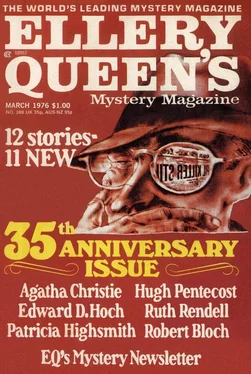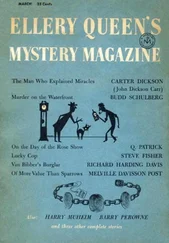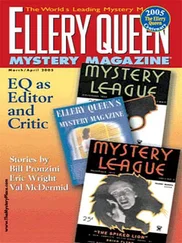Аврам Дэвидсон - Ellery Queen’s Mystery Magazine. Vol. 67, No. 3. Whole No. 388, March 1976
Здесь есть возможность читать онлайн «Аврам Дэвидсон - Ellery Queen’s Mystery Magazine. Vol. 67, No. 3. Whole No. 388, March 1976» весь текст электронной книги совершенно бесплатно (целиком полную версию без сокращений). В некоторых случаях можно слушать аудио, скачать через торрент в формате fb2 и присутствует краткое содержание. Город: New York, Год выпуска: 1976, Издательство: Davis Publications, Жанр: Детектив, на английском языке. Описание произведения, (предисловие) а так же отзывы посетителей доступны на портале библиотеки ЛибКат.
- Название:Ellery Queen’s Mystery Magazine. Vol. 67, No. 3. Whole No. 388, March 1976
- Автор:
- Издательство:Davis Publications
- Жанр:
- Год:1976
- Город:New York
- ISBN:нет данных
- Рейтинг книги:5 / 5. Голосов: 1
-
Избранное:Добавить в избранное
- Отзывы:
-
Ваша оценка:
- 100
- 1
- 2
- 3
- 4
- 5
Ellery Queen’s Mystery Magazine. Vol. 67, No. 3. Whole No. 388, March 1976: краткое содержание, описание и аннотация
Предлагаем к чтению аннотацию, описание, краткое содержание или предисловие (зависит от того, что написал сам автор книги «Ellery Queen’s Mystery Magazine. Vol. 67, No. 3. Whole No. 388, March 1976»). Если вы не нашли необходимую информацию о книге — напишите в комментариях, мы постараемся отыскать её.
Ellery Queen’s Mystery Magazine. Vol. 67, No. 3. Whole No. 388, March 1976 — читать онлайн бесплатно полную книгу (весь текст) целиком
Ниже представлен текст книги, разбитый по страницам. Система сохранения места последней прочитанной страницы, позволяет с удобством читать онлайн бесплатно книгу «Ellery Queen’s Mystery Magazine. Vol. 67, No. 3. Whole No. 388, March 1976», без необходимости каждый раз заново искать на чём Вы остановились. Поставьте закладку, и сможете в любой момент перейти на страницу, на которой закончили чтение.
Интервал:
Закладка:
“But it’s — it’s going to be all right?”
“Nobody connected with the law ever commits himself to a rash statement like that,” said Sir Edward solemnly, and made his escape.
He walked along the street, lost in thought. The puzzle was there under his hand — and he had not solved it. It needed something — some little thing. Just to point the way.
A hand fell on his shoulder and he started. It was Matthew Vaughan, somewhat out of breath.
“I’ve been chasing you. Sir Edward. I want to apologize. For my rotten manners half an hour ago. But I’ve not got the best temper in the world, I’m afraid. It’s awfully good of you to bother about this business. Please ask me whatever you like. If there’s anything I can do to help—”
Suddenly Sir Edward stiffened. His glance was fixed — not on Matthew, but across the street. Somewhat bewildered, Matthew repeated, “If there’s anything I can do to help—”
“You have already done it, my dear young man,” said Sir Edward. “By stopping me at this particular spot and so fixing my attention on something I might otherwise have missed.”
He pointed across the street to a small restaurant opposite.
“The Four and Twenty Blackbirds?” asked Matthew in a puzzled voice.
“Exactly.”
“It’s an odd name, but you get quite decent food there, I believe.”
“I shall not take the risk of experimenting,” said Sir Edward. “Being further from my nursery days than you are, my young friend, I probably remember my nursery rhymes better. There is a classic version that runs thus, if I remember rightly: Sing a song of sixpence, a pocket full of rye, Four and Twenty blackbirds baked in a pie — and so on. The rest of it does not concern us.”
He wheeled round sharply.
“Where are you going?” asked Matthew Vaughan.
“Back to your house.”
They walked there in silence, Matthew Vaughan shooting puzzled glances at his companion. Sir Edward entered, strode to a drawer, lifted out a velvet bag, and opened it. He looked at Matthew and the young man reluctantly left the room.
Sir Edward tumbled out the silver change on the table. Then he nodded. His memory had not been at fault.
He got up and rang the bell, slipping something into the palm of his hand as he did so.
Martha answered the bell.
“You told me, Martha, if I remember rightly, that you had a slight altercation with your late mistress over one of the new sixpences.”
“Yes, sir.”
“Ah, but the curious thing is, Martha, that among this loose change, there is no new sixpence. There are two sixpences, but they are both old ones.”
She stared at him in a puzzled fashion.
“You see what that means? Someone did come to the house that evening — someone to whom your mistress gave sixpence ... I think she gave it to him in exchange for this—”
With a swift movement he shot his hand forward, holding out the doggerel verse about unemployment.
One glance at her face was enough.
“The game is up, Martha — you see, I know. You may as well tell me everything.”
She sank down on a chair and tears raced down her face.
“It’s true — it’s true — the bell didn’t ring properly — I wasn’t sure, and then I thought I’d better go and see. I got to the door just as he struck her down. The roll of five-pound notes was on the table in front of her — it was the sight of them as made him do it — that and thinking she was alone in the house as she’d let him in. I couldn’t scream. I was too paralyzed and then he turned — and J saw it was my boy...
“Oh, he’s been a bad one always. I gave him all the money I could. He’s been in jail twice. He must have come around to see me, and then Miss Crabtree, seeing as I didn’t answer the door, went to answer it herself, and he was taken aback and pulled out one of those unemployment leaflets, and the mistress being always kind and charitable, told him to come in, and got out a sixpence.
“And all the time that roll of notes was lying on the table where it had been when I was giving her the change. And the devil got into my Ben and he got behind her and struck her down.”
“And then?” asked Sir Edward.
“Oh, sir, what could I do? My own flesh and blood. His father was a bad one, and Ben takes after him — but he was my own son. I hustled him out, and I went back to the kitchen, and I went to set the table for supper at the usual time. Do you think it was very wicked of me, sir? I tried to tell you no lies when you was asking me questions.”
Sir Edward rose.
“My poor woman,” he said with feeling in his voice. “I am very sorry for you. All the same, the law will have to take its course, you know.”
“He’s fled the country, sir. I don’t know where he is.”
“There’s a chance, then, that he may escape the gallows, but don’t count on it. Will you send Miss Magdalen to me?”
“Oh, Sir Edward. How wonderful of you — how wonderful you are,” said Magdalen when he had finished his brief recital. “You’ve saved us all. How can I ever thank you?”
Sir Edward smiled down at her and patted her hand gently. He was very much the great man. Little Magdalen had been very charming on the Siluric. That bloom of seventeen — wonderful! She had completely lost it now, of course.
“Next time you need a friend—” he said.
“I’ll come straight to you.”
“No, no,” cried Sir Edward in alarm. “That’s just what I don’t want you to do. Go to a younger man.”
He extricated himself with dexterity from the grateful household and hailing a taxi sank into it with a sigh of relief. Even the charm of a dewy seventeen seemed doubtful.
It could not really compare with a well-stocked library on criminology.
The taxi turned into Queen Anne’s Close.
His cul-de-sac.
A Most Unusual Murder
by Robert Bloch [9] © 1976 by Robert Bloch.
It all started outside an especially curious curiosity shop in London’s Saxe-Coburg Square ... and ended in a shabby lodging at 17 Dorcas Lane, the two friends drawn there by a famous mystery and themselves becoming part of the terrible legend ...
Only the dead know Brooklyn .
Thomas Wolfe said that, and he’s dead now, so he ought to know.
London, of course, is a different story.
At least that’s the way Hilary Kane thought of it. Not as a story, perhaps, but rather as an old-fashioned, outsize picaresque novel in which every street was a chapter crammed with characters and incidents of its own. Each block a page, each structure a separate paragraph unto itself within the sprawling, tangled plot — such was Hilary Kane’s concept of the city, and he knew it well.
Over the years he strolled the pavements, reading the city sentence by sentence until every line was familiar; he’d learned London by heart.
And that’s why he was so startled when, one bleak afternoon late in November, he discovered the shop in Saxe-Coburg Square.
“I’ll be damned!” he said.
“Probably.” Lester Woods, his companion, took the edge off the affirmation with an indulgent smile. “What’s the problem?”
“This.” Kane gestured towards the tiny window of the establishment nestled inconspicuously between two residential relics of Victoria’s day.
“An antique place.” Woods nodded. “At the rate they’re springing up there must be at least one for every tourist in London.”
“But not here.” Kane frowned. “I happen to have come by this way less than a week ago, and I’d swear there was no shop in the Square.”
“Then it must have opened since.” The two men moved up to the entrance, glancing through the display window in passing.
Читать дальшеИнтервал:
Закладка:
Похожие книги на «Ellery Queen’s Mystery Magazine. Vol. 67, No. 3. Whole No. 388, March 1976»
Представляем Вашему вниманию похожие книги на «Ellery Queen’s Mystery Magazine. Vol. 67, No. 3. Whole No. 388, March 1976» списком для выбора. Мы отобрали схожую по названию и смыслу литературу в надежде предоставить читателям больше вариантов отыскать новые, интересные, ещё непрочитанные произведения.
Обсуждение, отзывы о книге «Ellery Queen’s Mystery Magazine. Vol. 67, No. 3. Whole No. 388, March 1976» и просто собственные мнения читателей. Оставьте ваши комментарии, напишите, что Вы думаете о произведении, его смысле или главных героях. Укажите что конкретно понравилось, а что нет, и почему Вы так считаете.












